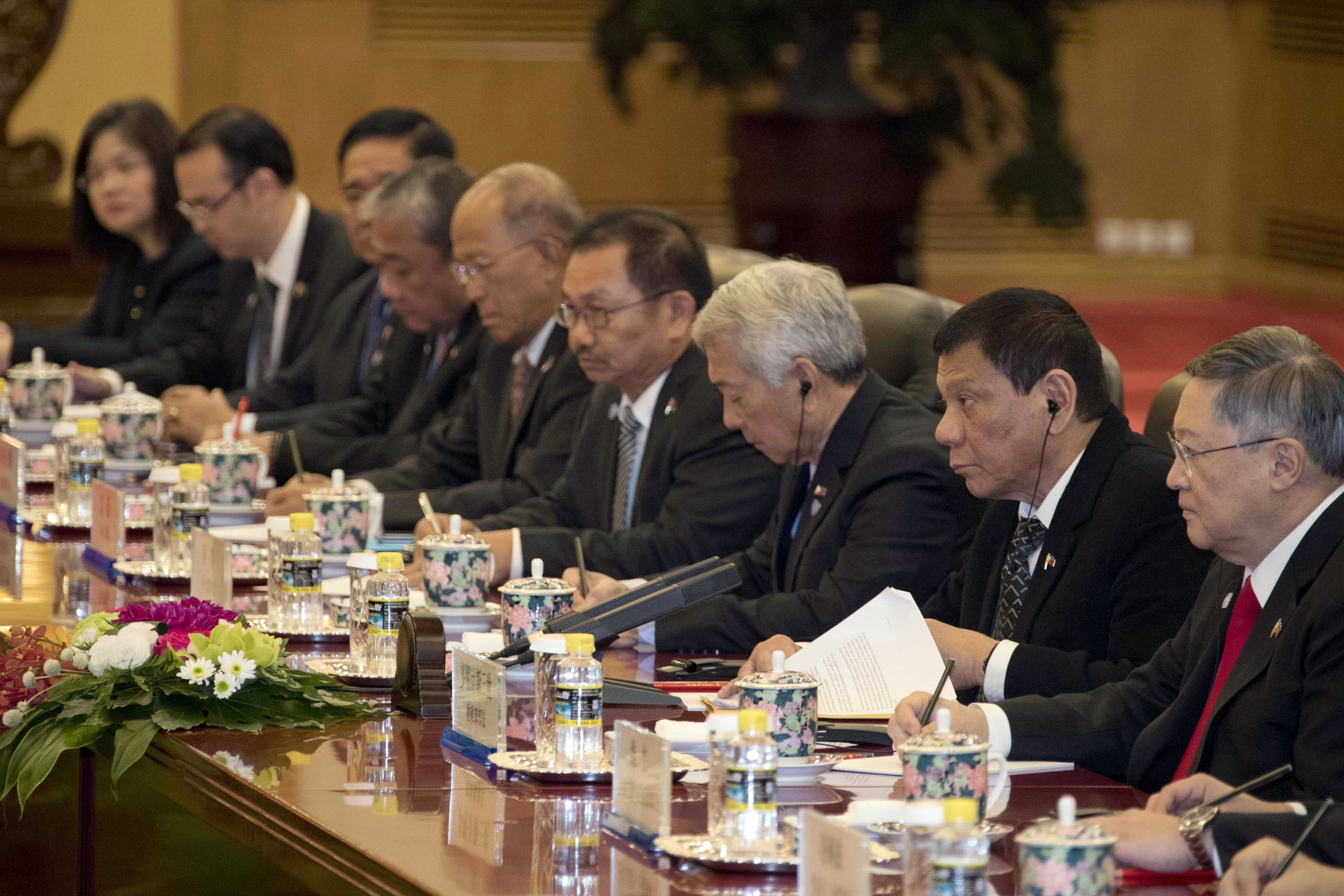
Philippine President Rodrigo Duterte, second from right, holds meetings with the Chinese President Xi Jinping during a bilateral meeting in the Great Hall of the People in Beijing, China, Thursday, Oct. 20, 2016. Duterte was meeting Thursday with Xi in Beijing as part of a charm offensive aimed at seeking trade and support from the Asian giant by setting aside a thorny territorial dispute. AP FILE PHOTO
THE HIGHLY influential Makati Business Club welcomed the Duterte administration’s efforts to revitalize the country’s relationship with China, but has stressed the need to maintain the Philippines’ strong and solid ties with the United States, particularly on the economic front.
At the same time, the group also urged the government to involve the business community, experts, policymakers, the academe and even the youth as it pushes for a recalibration of the country’s independent foreign policy, the MBC said Tuesday.
The MBC issued the statement following the recent controversial remarks made by President Duterte in China last week. During his state visit, Mr. Duterte announced the Philippines’ “separation” with the United States, which was later clarified to mean that the current administration only wanted to have a more independent foreign policy and had sought to have equal footing with its bilateral trade partners. Such remarks, however, still caused concerns and apprehension among foreign investors over what was starting to be perceived as instability in the Philippine business environment.
The MBC noted that given China’s stature as a major player in global affairs and the Philippines’ steady economic rise, the two countries stand to benefit from renewed ties, particularly when it comes to trade and investment. It also pointed out that China’s expertise in infrastructure will be critical to the Philippines’ development, as the country seeks to close the massive infrastructure gap that has been suppressing the country’s growth for the past years.
READ: Itemized list of PH projects covered by China’s $15-B investment pledges to Duterte
However, the MBC added: “We believe that as we strengthen ties with one of our neighbors, this should be in tandem with continuing to nurture our partnership with existing strategic allies and friends. In particular, our relationship with the United States, particularly on the economic front, should remain solid and should also be further expanded.”
According to the MBC, the United States is the country’s third largest trading partner, accounting for 12.7 percent of total trade. The Philippines exported $9 billion worth of goods to the US, while the country imported $7.47 billion, reflecting a trade surplus valued at $1.55 billion.
The two major pillars of the Philippine economy, namely the remittances of overseas Filipino workers and the revenues generated by the IT-business process management industry are closely linked with the United States, the group noted.
“Filipinos in the US contribute the highest amount of remittances, valued at $8.4 billion, accounting for 33 percent of total remittances sourced from all over the world. American firms have also been critical in the development of our BPO industry that, as of 2015, contributed $22 billion to the economy and provided 1.2 million jobs. The US is also among our major investors at $732 million in 2015, while Americans rank as our second largest market for tourists, generating P4.4 billion in tourist receipts. Moreover, solid people-to-people ties, shared history, and common values bind our two countries together,” the business group explained.
READ: Jittery BPOs knock on Duterte’s door
The MBC also pointed out that the US has delivered $90.9 million worth of financial aid and has offered extensive manpower and technical support to the government’s rescue and rehabilitation efforts in the aftermath of Typhoon Yolanda.\
READ: Russel: ‘Strings attached’ in US aid to PH ‘factually wrong’
Overall, the US has contributed 36.1 percent of the official development aid (ODA) grants to the Philippines as against the other countries that have extended a much smaller grants portfolio. The US-based Millennium Challenge Corp., in particular, has extended over $433 million worth of anti-poverty and human development programs in the Philippines since 2006.
“These figures reflect the invaluable commitment and steadfastness of the US in assisting the growth of our people and our communities,” it added.
Meanwhile, the MBC also asked the government to initiate another multisectoral dialogue similar to what it conducted when it drafted the 10-point socio-economic agenda. This was necessary as the government goes through a recalibration in the country’s foreign policy.
“We support the drive for an independent foreign policy, particularly during this time when the Philippines has gained international respect, recognition and confidence over the past few years,” the MBC said.
“We hope that the government will also invite the views of eminent leaders, foreign policy experts, policy makers, business, the academe, and the youth. It is important for the world to see that the government continues its inclusive engagement and welcomes investments that will generate jobs. The Makati Business Club is prepared to participate in this discussion, as we work towards our shared aspiration of a progressive and inclusive Philippines,” it added. CDG